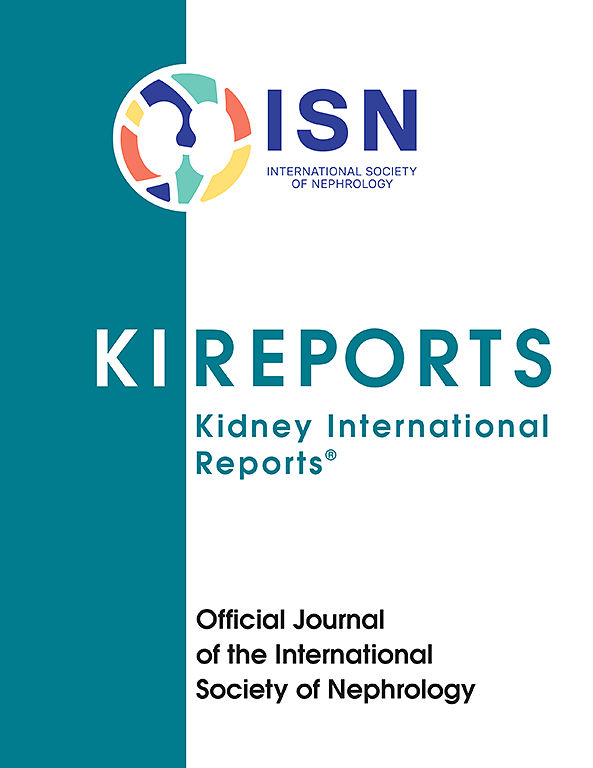外泌体mRNA尿检测对人肾移植排斥反应的检测和风险分层
IF 5.7
2区 医学
Q1 UROLOGY & NEPHROLOGY
引用次数: 0
摘要
我们最近发现了两个尿外泌体mRNA特征,用于识别和区分肾移植受者的t细胞介导的排斥反应(TCMR)和抗体介导的排斥反应(ABMR)。在这里,我们开发了外泌体移植排斥尿(ExoTRU),这是一种基于先前发现队列的4基因特征的尿液检测,在接受临床指示活检的肾移植受体的新队列中显示了其临床实用性,并通过单独的实验室在独立的患者队列中进行了验证。方法建立了适合临床实验室的工作流程,允许更小的尿量和广泛标准化的qPCR仪器。来自214名患者的226份尿液样本与临床指示的活检配对。评估尿外泌体mrna水平是否符合先前定义的目标。结果4种mrna (IL32、B2M、CXCL11和PGK1)在区分有排斥反应或明显炎症的活检组织与无炎症的活检组织方面表现良好,灵敏度为94%,阳性预测值为62%,特异性为52%。在5年随访期间,标记阳性但活检阴性的患者出现不良结果的可能性几乎是其两倍,包括随后的排斥反应,从而显示了肾活检的局限性和分子标记的预后潜力。独立验证队列的评价也表现出类似的效果,曲线下面积(AUC)为0.838。另一个6个基因的标记将TCMR与ABMR区分开来,AUC为0.756。结论外泌体mRNA基因标记可识别不同阶段和类别的排斥反应患者,包括早期和显著炎症,从而改善决策和患者管理,并将不必要的活检减少45%。这代表了一种潜在的风险分层工具,基于阳性患者的不良预后。本文章由计算机程序翻译,如有差异,请以英文原文为准。

An Exosomal mRNA Urine Test for Detection and Risk Stratification of Human Kidney Transplant Rejection
Introduction
We recently discovered 2 urinary exosomal mRNA signatures to identify and differentiate T-cell–mediated rejection (TCMR) from antibody-mediated rejection (ABMR) in kidney transplant recipients. Here, we developed Exosome Transplant Rejection Urine (ExoTRU), a urinetest based on a 4-gene signature from the previous discovery cohort, showed its clinical utility in a new cohort of kidney transplant recipients undergoing clinically indicated biopsies, and validated it through a separate laboratory in an independent-cohort of patients.
Methods
A workflow suited for clinical laboratories was developed, allowing for smaller urine volumes and widely standardized qPCR instrumentation. A total of 226 urine samples from 214 patients were paired with clinically indicated biopsies. Urinary exosomal mRNAs levels were evaluated for previously defined targets.
Results
Four mRNAs (IL32, B2M, CXCL11, and PGK1) performed well in distinguishing biopsies with rejection or significant inflammation from those without inflammation, achieving 94% sensitivity, 62% positive predictive value, and 52% specificity. Patients who tested positive by the signature but negative by biopsy were nearly twice as likely to experience adverse outcomes in the 5-year follow-up period, including subsequent rejection, thereby showing the limitations of kidney biopsies and the prognostic potential of molecular signatures. The evaluation of an independent validation cohort showed similar performance, achieving an area under the curve (AUC) of 0.838. Another 6-gene signature distinguished TCMR from ABMR, with an AUC of 0.756.
Conclusion
Exosomal mRNA gene signatures identified patients with different stages and classes of rejection, including early stage and significant inflammation, enabling improved decision-making and patient management and reducing unnecessary biopsies by 45%. This represents a potential tool for risk stratification based on poor outcomes in patients with positive signatures.
求助全文
通过发布文献求助,成功后即可免费获取论文全文。
去求助
来源期刊

Kidney International Reports
Medicine-Nephrology
CiteScore
7.70
自引率
3.30%
发文量
1578
审稿时长
8 weeks
期刊介绍:
Kidney International Reports, an official journal of the International Society of Nephrology, is a peer-reviewed, open access journal devoted to the publication of leading research and developments related to kidney disease. With the primary aim of contributing to improved care of patients with kidney disease, the journal will publish original clinical and select translational articles and educational content related to the pathogenesis, evaluation and management of acute and chronic kidney disease, end stage renal disease (including transplantation), acid-base, fluid and electrolyte disturbances and hypertension. Of particular interest are submissions related to clinical trials, epidemiology, systematic reviews (including meta-analyses) and outcomes research. The journal will also provide a platform for wider dissemination of national and regional guidelines as well as consensus meeting reports.
 求助内容:
求助内容: 应助结果提醒方式:
应助结果提醒方式:


